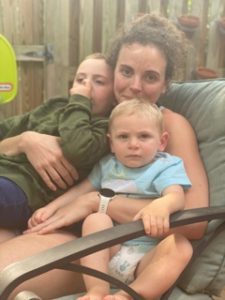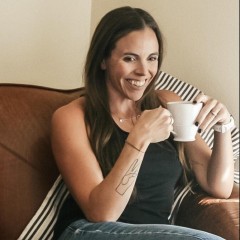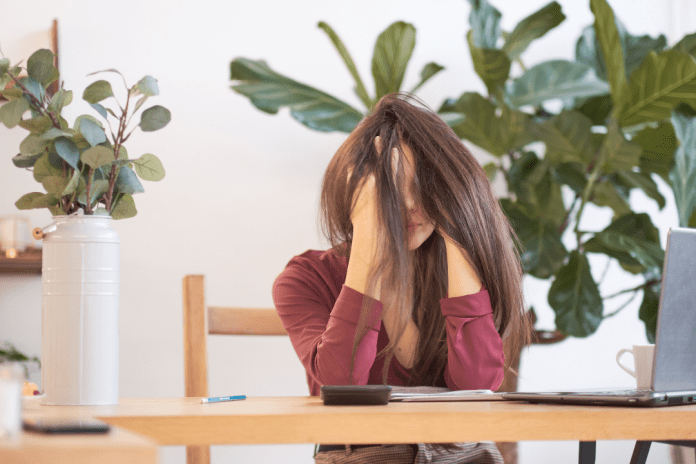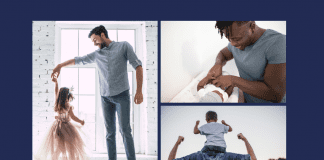While the mental health community and culture has been gaining traction over the last couple of years, we as a society still have a very long way to go to create a truly safe space for those dealing with mental health diagnoses. The stigma needs to be removed before people begin to feel comfortable sharing their story.
Which is why I am sharing mine.
While my mental health path has been far less severe than many I know, I truly believe that by normalizing my story, I can help pave the way towards normalizing theirs. And as we navigate the world of women’s mental health, we can also begin to break down the dangerous societal norms of diet culture and how if effects women.
My Story
Personally, motherhood exacerbated an already extreme situation. I have a history of anxiety that has been around since my early adolescence and directly linked to disordered eating, binging, purging, extreme dieting, and exercise. I thought I was coping with my anxiety through control.
 When my first son was born, I thought the tears, stress, and sense of overwhelm was just my hormones, and so did my husband. It wasn’t until looking back a couple of years later that I realized I should have reached out for help.
When my first son was born, I thought the tears, stress, and sense of overwhelm was just my hormones, and so did my husband. It wasn’t until looking back a couple of years later that I realized I should have reached out for help.
I channeled that anxiety to getting my body back. During this time my husband was deployed. So I felt no need to hide the weekly weigh-ins, measurements, and restrictive eating I was doing. I would disguise purging as “being too full.” I was not healthy.
As I reflect on this time now, I wonder why I didn’t ask for help or go back to therapy. And I realized that maternal mental health is a lonely battle. We silently struggle and pretend everything is okay because who is going to listen anyway?
When I had my second son, my husband had to go away for a couple of weeks for training. I found myself exhibiting similar behaviors as before. This time around, my behaviors had escalated.
 I screamed A LOT.
I screamed A LOT.
I sweated, felt overwhelmed, felt like I was a ticking time-bomb.
I was easily agitated and quick to snap.
I felt like I was going to implode at any moment.
When women go to their 6 week postpartum appointment, we answer the ten question anxiety/depression screening. I felt that all my doctor was concerned with was what kind of birth control I wanted to get on and to make sure I was cleared for sex. A ten question screening is not enough. We need and deserve more. The reality is that the current system for maternal mental health is failing women.
Pandemic + PCS=Breakdown
During the 2020-2021 Covid lockdown, burnout for women was (and continues to be) staggering. While burn-out is categorized as an occupational phenomenon, it is directly linked to depression and anxiety.
Burnout is happening at home, with our children, and at work. We are expected to do it all. This is a reality women face daily. Women are exhausted. The mental load that taxes women has increased tenfold because we are forced or made to believe that we have to “do it all” in the same place, at the same time.
I was no different. I lost all desire to do anything, and my climbing weight gave me constant anxiety. This led me to return to the same toxic behaviors I had entertained years earlier.
 After we PCSd, depression and anxiety really hit a precipice. That implosion that I had felt coming for nearly 20 years finally happened.
After we PCSd, depression and anxiety really hit a precipice. That implosion that I had felt coming for nearly 20 years finally happened.
Depression and anxiety had taken a hold of every area of my life. I was an island. I put up walls and shut everyone out and was drowning myself in my own misery. I was going through the motions of everyday life, pretending everything was alright when it most definitely wasn’t.
This time when I reached out for help, I was heard. I scored a 24/27 for depression and a 21/21 for anxiety. Within 48 hours I was placed on medication and assigned to a medication manager that I saw weekly via Zoom while I was waitlisted for therapy.
Then + Now
Six months later, I feel better than I have in years. I feel like me. A few weeks ago my husband looked at me and said, “It feels so good to have my wife back”.
That really hit me.
I had spent so long getting worse and worse that we didn’t notice until I imploded.
Because of medication and treatment, I am a better wife. I am a better mother. I am a better daughter. I am a better friend.
If I hadn’t advocated for myself or had a family member advocate for me, I don’t
know what would have happened to me or my children.
The idea that our healthcare system has not and cannot step forward and provide more services to postpartum women is insulting. Our culture is so quick to want women to have children, a job, a family, and a happy marriage that we are left to navigate this on our own. In a country that has erectile dysfunction medication at the ready but can’t do more than one postnatal follow-up with a mother is arguably one of the biggest flaws in the mental health/healthcare movement.
But normalizing my story hopefully normalizes yours. You are not alone. And until we reach a better place in our healthcare and society for moms, we must advocate for ourselves.
If you feel like you need support please follow the links below:
Military One Source
2020 Mom
The Blue Dot Project
Maternal Mental Heath Alliance
Maternal Mental Health Now
 Get to know more about Meg Reichert and how she works in the Women’s Wellness field:
Get to know more about Meg Reichert and how she works in the Women’s Wellness field:
Reichert Wellness website
Facebook
Instagram
Email Meg











